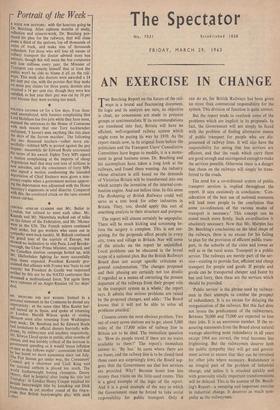Portrait of the Week
WEEK. FOR DOCTORS: With the honours going to Dr. Beeching. After eighteen months of study. reflection and scissors-work, Dr. Beeching pro- duced his plan for the railways, that will close down a third of the stations, lop off thousands of miles of track, and make tens of thousands redundant. For those who will lose all means of railway transport the doctor advised more bus services; though this will mean the bus companies will lose millions every year, the Minister of Transport can console himself that at least the public won't be able to blame it all on the rail- ways. This week also doctors were awarded a 14 Per cent pay rise, with the proviso that they make no more pay claims for three years; dentists also received a 14 per cent rise, though they were less satisfied, as last year their pay was cut by 10 per cent because they were earning too much.
POLITICS LIVENED UP for a few days. Four thou- sand unemployed, with banners complaining that Lord Hai!sham has five jobs while they have none, stormed the entrances to the House of Commons with such venom that one Tory backbencher exclaimed, haven't seen anything like this since the days of the Jarrow marches'. The following day two thousand teachers—rather more res- pectfully—lobbied MPs in protest against the pay dispute: meanwhile Sir Edward Boyle announced the terms of his award. Eighty Tory MPs signed a motion complaining at the imports of cheap Argentinian beef that may cost tens of millions in new subsidies, and the consciences of forty MPs who signed a motion condemning the intended deportation of Chief Enahoro were given a tem- porary respite when a government motion approv- ing the deportation was adjourned with the Home Secretary's arguments in total disarray. Compared with this, the continued attack on the rates seemed almost old-hat..
CENTRAL AFRICAN LEADERS met Mr. Butler in London, but refused to meet each other. Mr. Kaunda and Mr. Nkumbula walked out of talks on the future of the Federation, and Mr. Nkomo went to the UN. The French miners continued their strike, but gas workers who came out in sYrnpathy went back meekly. M. Bidault continued his grand tour of the capitals of Europe, but showed no inclination to visit Paris. Lord Brooke- borough the Ulster Prime Minister, resigned, and the Canadian election campaign hotted up, with Diefenbaker fighting far more successfully than many expected. President Kennedy pro- claimed that alliance with France was 'basic to our security' but President de Gaulle was impressed neither by this nor by the NATO conference that discussed a multinational force. Yet again there
were rumours of an Anglo-Russian 'oil for ships' deal.
PROFUMO DID NOT RESIGN. Instead in a Personal statement in the Commons he denied any impropriety : at the same time Miss Keeler her- self turned up in Spain, and spoke of returning to London. Harold Wilson spoke of visiting Moscow soon after returning from Washington next week : Dr. Beeching and Sir Edward Boyle had invitations to official dinners hurriedly with- drawn, by railwaymen and teachers respectively. Mr. Selwyn Lloyd spoke in public, after months of silence, and was harshly critical of the increase in government spending as it would 'mean inflation
as sure as day follows night': economists felt' that he has learnt no more economics since last July,
The Flat Season got under way, the Consumers' Council got a chairman and Cecil King said the national anthem is played too much. The world featherweight boxing champion, Davey loore, died in hospital after losing his title last Thursday: in London Henry Cooper retained his British heavyweight title by knocking out Dick Richardson in yet another round of the ring-a-
roses that British heavyweights play with each other.














































 Previous page
Previous page